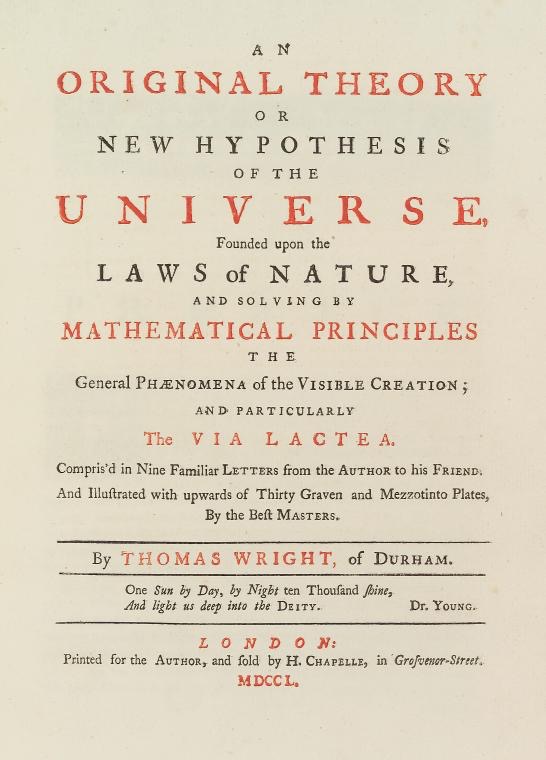Nullness

Thomas Wright:
An original theory or new hypothesis of the universe
(1750)
"Success often resides in no result."
Determining when something's working can prove damnably difficult. Over many years, scientists have devised counter-intuitive methods for better bulletproofing their assertions. Prominent among them must be The Null Hypothesis. This convention turns inquiry on its head because instead of presuming effectiveness, i.e., something's different, it presumes no change at all, or no significant change. Success under this arrangement must be inferred because it might not prove directly observable. We can see what isn't much easier than we might see what might be there. This convention leads scientists to produce different conclusions than those made by the typical layperson, even one armed with connection to The Internets, because the layperson tends to ask the wrong sorts of questions.
Search, for instance, isn't very closely correlated with research. Asking Google a question tends to produce the response you're looking for rather than a fair assessment of whether you've asked a valid question. For instance, there's a cell tower siting controversy in our fair city, and a few self-styled activists have managed to convince themselves that this tower represents a clear and present health danger to themselves and our community. There's certainly no shortage of terrifying reporting out there on the damaging effects of cell tower radiation, virtually all of it in direct contradiction to our FCC's conclusions. Our activists, pumped up with the results of their Successful Google searches, concluded that our government, their government, must be foisting a massive coverup on its innocent citizens. What else could they conclude?
They might have chosen to make curated searches, what might qualify as genuine research, by first omitting the many crackpot sites dealing in misinformation and worse. Who might be qualified to curate such a search? Well, the FCC comes quickly to mind, but if the searcher's mind starts convinced that the government's some deep-state conspiracy, the possibility of employing anything like a genuinely scientific strategy for answering the question falls far out of reach. Free, then, to draw conclusions, the searchers find precisely what they expected, never suspecting for a second that they've merely asked themselves and Googled the wrong sort of questions. They neglected to include Nullness in their consideration.
I'm clearly out of my element here because I'm about as lame a layperson imaginable. From numerous statistics courses I sat through in college, I remember that the much-vaunted null hypothesis sought significance. Can cell phone tower radiation do damage? Undoubtedly, the scientists say, but only if you're closer than twenty-five feet, which proves difficult to manage when the danged thing's sixty-some feet off the ground. The beam, ray, or whatever it produces gets aimed at the horizon, so nearby structures remain unaffected. We can speak of aesthetic issues, but we probably shouldn't conclude that the proposed cell tower will prove damaging to nearby people or property. The Null Hypothesis explains why.
Nullness serves as the unexpected property of Success. It notices when there's no difference, when the presumption that something won't exist seems to be validated by test results. Most of us fail even to test; we seek instead, and unsurprisingly, we find almost precisely what we expected, our heads filled with vacuous content rather than Nullness. We seem poised and ever-ready to jump into our conclusion, bolstered by identity-preserving presumptions. Ask the anti-vaxers why. I think this results from a common human fragility, the sometimes desperate need to feel oppressed, to justify our innate paranoia of being up against some overwhelming opponents because, of course, we are. Inertia and entropy explain much more than might malign intent. The Nullness speaks volumes without actually saying much. Success often resides in no result at all.
©2023 by David A. Schmaltz - all rights reserved


